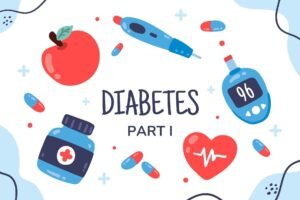
DIABETES – Everything you should Know – Part I
This topic mainly will be including-
- Basics of Diabetes ( 1st part)
- Types of Diabetes ( 1st part)
- Symptoms and signs of diabetes
- Complications of Diabetes
- Diagnosis and Prognosis of Diabetes
- Treatment for Diabetes
- Lifestyles modification
- Myths of Diabetes.
BASICS OF DIABETES –
What is diabetes?
Diabetes is a form of disease that involves problems with the hormone insulin. Normally, the pancreas releases insulin to help your body store and use the sugar and fat from the food you eat. Diabetes occurs when one of the following occurs:
- When the pancreas does not produce any insulin
- When the pancreas produces very little insulin
- When the body does not respond appropriately to secreted insulin, a condition called “insulin resistance”.
HOW DOES INSULIN WORK?
- Our body is made up of millions of cells. To make energy, these cells need food in a very simple form. When we eat or drink, much of our food is broken down into a simple sugar called “glucose.” Then, glucose is transported through the bloodstream to the cells of our body where it can be used to provide some of the energy our body needs for daily activities.
- The amount of glucose in our bloodstream is tightly regulated by the hormone insulin. Insulin is always being released in small amounts by the pancreas. When the amount of glucose in your blood rises to a certain level, the pancreas will release more insulin to push more glucose into the cells. This causes the glucose levels in our blood (blood glucose levels) to drop.
- To keep our blood glucose levels from getting too low (hypoglycemia or low blood sugar), our body signals to eat and releases some glucose from storage kept in the liver.
- People with diabetes either don’t make insulin or their body’s cells are resistant to insulin, leading to high levels of sugar circulating in the blood, called simply high blood sugar.
TYPES OF DIABETES –
- Type 1 Diabetes-
- Type 1 diabetes occurs because the insulin-producing cells of the pancreas (called beta cells) are destroyed by the immune system. People with type 1 diabetes produce no insulin and must use insulin injections to control their blood sugar.
- Type 1 diabetes most commonly starts in people under the age of 20 but may occur at any age.
- Type 2 Diabetes
- Unlike people with type 1 diabetes, people with type 2 diabetes produce insulin. However, the insulin their pancreas secretes is either not enough or the body is resistant to the insulin. When there isn’t enough insulin or the insulin is not used as it should be, glucose can’t get into the body’s cells.
- Type 2 diabetes is the most common form of diabetes, while most of these cases can be prevented, it remains for adults the leading cause of diabetes-related complications such as blindness, non-traumatic amputations, and chronic kidney failure requiring dialysis
- Gestational Diabetes
- Gestational diabetes is triggered by pregnancy. Hormone changes during pregnancy can affect insulin’s ability to work properly.
- Pregnant women who have an increased risk of developing gestational diabetes are those who are over 25 years old, are overweight before pregnancy, and have a family history of diabetes.
- Screening for gestational diabetes is important during pregnancy. Left untreated, gestational diabetes increases the risk of complications for both the mother and her unborn child.
- Usually, blood sugar levels return to normal within six weeks of childbirth. However, women who have had gestational diabetes have an increased risk of developing type 2 diabetes later in life.
Disclaimer :
“The content of this publication has been developed by a third party content provider. The content herein has been developed by clinicians and/or medical writers and/or experts. The information contained herein is for educational purpose only and we request you to please consult a Registered Medical Practioner or Doctor before deciding the appropriate diagnosis and treatment.”
We are the Best Pathology Lab on Sinhgad Road i.e. SAHAYOG PATHOLOGY LABORATORY,
Shop no F 17 DC1 Nanded City, Sinhagad Road Pune
Fully equipped laboratory in Nanded city, Sinhgad Road, Pune
Collection Centres at Warje, Dhayri, Ambegaon, Kirkitwadi, Manik Baug, Undri.
. For more info visit us at https://sahayogdiagnostics.in/

